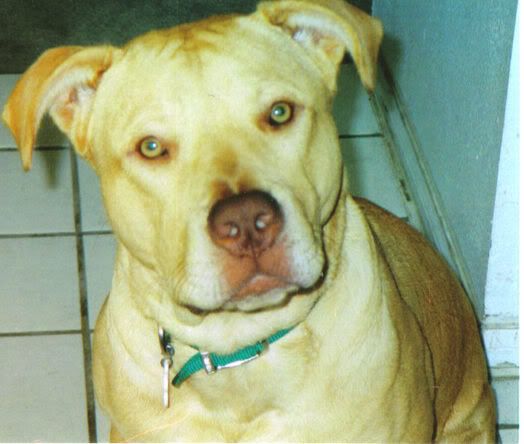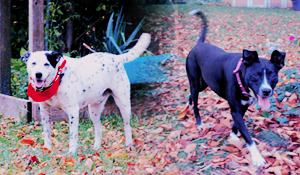I am writing in response to your letter addressed to our building about âpit bullsâ living in our complex. I am highly disappointed with this complex and their attitude towards this âbreedâ. I would be more inclined to agree with your letter and rules if there are incidences of âpit bullsâ attacking other dogs and people, but I am highly suspect that the individual(s) who reported these dogs are just ignorant of the breed and afraid because of the misinformation and lack of education in todayâs society about these loving pets.
âPit bullâ is a generic term often used to describe all dogs with similar traits and characteristics often known by the public as "Pit Bulls". The "Pit Bull" Group includes: (parentheses include breed names that are interchangeable) Alaunt (3 types, ancient breed for fighting, hunting and guarding.)⦠Molossus (Coliseum Dogs, used for spectator sports), Spanish Pointer and Spanish Alano (believed to be predecessors of guard dogs), White Terrier (believed to be a predecessor of many bull and terrier dogs), Neapolitan Mastiff (also called Italian Mastiff), Dogue de Bordeaux and larger Doguin de Bordeaux (French Mastiffs), Fila Brasilario (Brazilian Mastiff), Dogo Argentina (Argentinian Mastiff), Presa Canario (Canary Island Dog), Cane Corso, English Bulldog , French Bulldog, Boxer, Alapahoola Blue Blood (Hog herding dog), American Bulldog (recreation of old style Bulldog for agility), Olde Bulldogge (also a recreation of the old style bulldog for guarding work), Victorian Bulldog, Boston Terrier (very small), American (Pit) Bull Terrier (Registered by UKC), (English) Bull Terrier, Miniature Bull Terrier, (American) Staffordshire Terrier (AKC), (English) Staffordshire Bull Terrier, Chinese Shar Pei (Chinese Fighting Dog, became almost extinct when western fighting dogs entered China but brought back to popularity as a pet because of it's unusual wrinkled skin.), Chow Chow ( used for guarding and as food), Akita (Japanese Fighting Dog), Tosa Inu (Japanese Mastiff), (Swinford) Bandog (American Mastiff) cross between male American (Pit) Bull Terrier and female Neapolitan. This information can be found at
http://www.pethelp.net/pits.html.
Pit Bulls are wonderful animals that deserve a chance to have a good life like any other dog. Little is known about the background of rescue dogs. Some may be gamebred APBT (from fighting lines), some may be registered show dogs, some may be Am Staffs, some may look like APBTs but might be mixed with other breeds, etc. There is no way to know for sure unless you have the pedigree of the dog. As âpit bullâ is not a particular breed, but a groups of different breeds, which one are you referring to? How do you know if any of the rescued dogs here at Fieldstone are or are not âpit bullâ mixed? Or any of the ârestrictedâ breeds? How do you know that these dogs you were informed about are Pit Bulls and who can prove it? Iâve known many âpit bullsâ that are extremely friendly and would trust them more than some of the âtame breedsâ in this complex! My dog has been growled and snapped at by a Labrador, a collie, and a springer spaniel for no reason other than my dog was looking at them, perhaps they should be a restricted breed as well?
Another very important characteristic of Pit Bull dogs is their amazing love of people. Many people are surprised by the loving personality of these dogs the first time they meet one. Pit Bull dogs are indeed remarkably affectionate and truly enjoy human attention. They are wonderful cuddlers, and nothing beats a belly rub. In fact, most Pit Bulls think they are lap dogs!
Like any other breed, Pit bulls can develop behavior problems if poorly bred, mishandled, abused, unsocialized, etc., that could result in inappropriate aggression. Any large, strong, and powerful dog that attacks can do a lot of damage. This is why temperament evaluation is important when dealing with dogs of certain size and potential.
Do not, on the other hand, assume that because a dog can be quarrelsome with other dogs that he is "vicious", will attack children, or has to tied out with logging chains in the backyard and not treated as a pet. Many working breeds have antipathy towards other animals - coonhounds go mad at the sight of a raccoon, foxhounds will not hesitate to tear a dog-like fox to shreds, greyhounds live to chase and maul rabbits and will eagerly kill cats. They are still used today to chase down and slaughter coyotes. Even the ever-friendly beagle will slaughter a rabbit, given the chance. And yet the greyhound, coon and foxhound and beagle are among the friendliest of breeds towards humans. And it is the same with the pit bulldog. His work through the years has been control of other animals - never humans. A correct pit bull is more often than not submissive toward all humans, and adores children. A pit bull that snarls, lunges or growls at non-threatening humans is NOT typical of the breed, and to keep such a dog endangers people, pets and the image of the breed we love. Nothing could be more wrong than for these people-loving dogs to be considered a vicious breed. A correct pit bull is NOT a good choice as a guard dog - only unsound pit bulls will react with aggression towards a stranger walking by. A normal pit bull looks upon all people as friends unless their actions prove otherwise. This happy-go-lucky attitude is a result of their confidence.
Unlike the myth propagated by the media however, human aggression is NOT a problem specific to the Pit Bull breed. In fact, Pit Bulls tend to do better than average in temperament tests. Today, a properly bred Pit Bull is so exuberantly happy upon meeting her owner's friends (or even friendly strangers) that new owners sometimes worry that their dog is too sweet and fun-loving to protect their home and family... A multitalented companion, the well-trained Pit Bull is suited for a variety of exciting activities. He excels at obedience, agility and weight-pulling competitions, events which showcase intelligence, trainability and strength. In addition, the Pit Bull's pleasant nature makes him an ideal candidate for therapy work with people. In both 2002 and 2003, according to the American Temperament Test Society breed statistics, the American pit bull terrier out performed the golden retriever, a breed noted for its gentle temperament.
Pit Bulls get along great with other pets and may live happily with other dogs without any incidents. We just can't assume that this is true for all of them, or take for granted that Pit Bulls getting along with other pets today will do as well with those same pets tomorrow. Pit Bull owners need to have common sense and to make sure they don't set their dogs up for failure by putting them in the wrong situations. Animal-aggression and people-aggression are two distinctive traits and should never be confused. Unless they have been very poorly bred and/or specifically "trained" to attack humans (often by undesirable individuals through abusive methods), Pit Bulls are by nature very good with people. They are in fact one of the most loving, loyal, friendly, and dedicated companions one can have.








 Reply With Quote
Reply With Quote







 They said our dog was "too big" and we were forced to sell poor Rosie. She didn't even come up to our knees, height-wise. So what is "too big"?? Don't they mean: the dog barked because some jackass came in without us there so the dog has to go?? Yeah. That makes more sense.
They said our dog was "too big" and we were forced to sell poor Rosie. She didn't even come up to our knees, height-wise. So what is "too big"?? Don't they mean: the dog barked because some jackass came in without us there so the dog has to go?? Yeah. That makes more sense.




Bookmarks